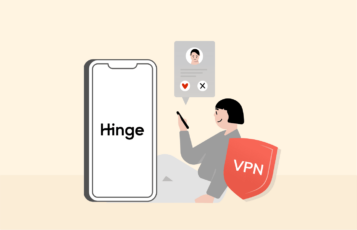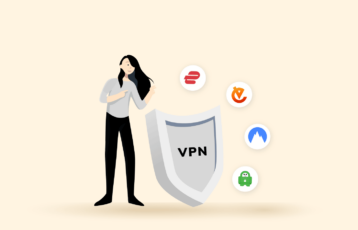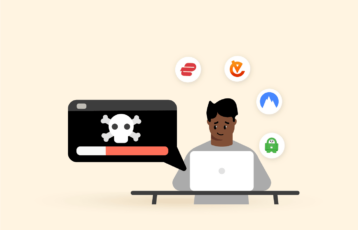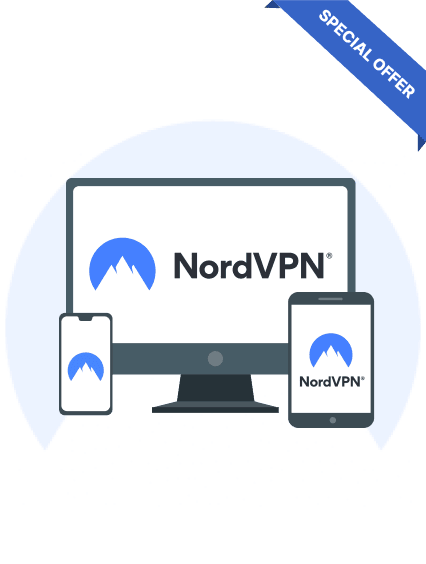Having a VPN is a basic need for digital life these days. You can protect all your devices, as this technology is compatible with almost all media players and devices, and routers are no exception. Installing a VPN on your router protects your household devices at once.
However, which service is best for the router? In this article, we list the top VPN services to use on your router.
The best router VPN in 2024 – The quick list
If you’re in a rush and only need to get the gist of this article, here it is. These are the best five VPNs if you want to use them with your router.
- NordVPN. The best overall VPN in the industry is also the best option for routers.
- ExpressVPN. The most established name in the VPN world also delivers the goods with routers.
- Surfshark. The VPN universe-s enfant terrible take routers seriously and offers lots of resources in that regard.
- VyprVPN. A Swiss privacy champion that also has broad support for routers.
- IPVanish. This VPN has developed software that’s easy to use without a keyboard or a mouse.
What is a router VPN?
A router VPN differs from a usual VPN client installed on a PC or smartphone. Regardless of the platform, all VPNs serve the same purpose: to tunnel your network connection through secure servers. Basically, a router VPN provides a secure and encrypted connection to the internet. Your online activity is anonymous and protected from prying eyes such as government surveillance, hackers, and ISPs.
The convenience that comes with a router VPN is unmatched. The device comes in handy because it’s a one-time setup that protects all your devices, provided they’re connected to the same router. Some devices, like game consoles and smart TVs, may not support VPN installation. In such cases, a router VPN provides a secure connection. When choosing a router VPN, select a provider that doesn’t limit the number of devices. This will allow you to connect as many devices as possible to the router VPN.
Why should I use a VPN router? Because it has benefits!
There are several benefits to using a VPN router compared to setting up secure connections on every device individually. Let’s have a look at the main ones:
1. Securing devices that do not support VPN apps
VPN vendors usually offer apps for phones, tablets, and computers because these devices exchange more information with the internet. But what about Smart TVs, game consoles, alarm systems, and other gadgets requiring an internet connection that do not support app installation? All internet traffic will be automatically protected if your router uses a VPN by default. And yes, that means every single device.
2. Securing all devices in the local network with a single connection
Surfshark allows unlimited network connections, but most other providers limit them. For example, let’s say that you pick a VPN that supports five concurrent connections, but you have two phones, a laptop, a desktop computer, and two tablets.
That means one of your devices can’t be in the VPN if you configure each individually. In contrast, if you have your VPN in your router, the six devices will be secure through a single connection to the network. The VPN will count the connections as one – only the router.
3. Doubling protection up
Are you one of those users who intend to have two VPNs working on top of each other for increased security? Then, installing a VPN on the router is the right option for you. Of course, you can use the Double VPN feature as an alternative to it if your provider offers this option. But if it doesn’t, installing two VPNs together will cause problems in the network configuration. However, installing one on your router will remove almost all the friction from the setup process.
4. Unlocking geo-restricted servers
VPNs hide your IP address and show the world a different one from its network. Hence, you can make the rest of the world think you’re elsewhere in the world. Furthermore, if your VPN has a server in any given country, you can pass it as a user from that country as long as you pick it as your VPN server. This lovely little feature allows you to unlock video streaming services such as Netflix, which offers different catalogs and content to users of other countries.
The best router VPN services to use today – Detailed list
1. NordVPN

A well-established vendor offering robust security, impressive unblocking capabilities, P2P-optimized servers, and more.
Pros
- Fast speeds
- Allows P2P traffic
- Colossal server coverage
Cons
- Desktop application may be tricky for some users
Every time our staff runs VPN tests for whatever task you could imagine, NordVPN comes out on top as the best option. So it was no surprise that it’s also the best option to install in your home router.
The server network is vast, with more than 5000 servers worldwide. It includes specialized servers for video streaming, torrenting, Tor over VPN, double VPN, and anti-DDoS.
But how does it do when it comes to routers?
NordVPN has a detailed guide on how to install it in pre-configured routers. You will also find a setup tutorial about the OpenWrt firmware, which is becoming popular. Such tutorials are rare among VPN vendors. The live chat team is always there to solve your problem quickly and effectively.
NordVPN is the best VPN for video streaming tasks. If a video streaming service is susceptible to unblocking, NordVPN does the trick without breaking a sweat.
The vendor supports Linux (another rare feature), Windows, macOS, Android, iOS, and Amazon Fire TV. In addition, your account supports ten simultaneous devices connecting to the VPN anytime. But your router counts as a single device, no matter how many other devices use it to reach the VPN.
The security features in NordVPN are top-notch. The encryption is strong, safe against DNS leaks, and includes a kill switch and automatic WiFi protection. Also, it has the fastest connections in the industry as it managed to turn WireGuard, the most advanced VPN protocol, into a commercially viable product.
2. ExpressVPN

Offers budget-friendly long-term plans, unlimited bandwidth, zero logs policy, SmartPlay feature, and more.
Pros
- Fast speeds across all server locations
- Allows P2P downloads
- Advanced privacy offerings
Cons
- Slightly costly
ExpressVPN has the best reputation in the VPN verse. That is because it’s been around for an extended period, always offering the best and most advanced service.
This service has something for everybody. The app is simple enough to make newbies feel comfortable using it. It also has plenty of custom options under the hood so that the most advanced users can have their service tweaked in the utmost detail.
While ExpressVPN is quite impressive, it excels in the router arena. It makes custom firmware-supporting installations on any compatible router with minimal effort. Moreover, if your router is already VPN-enabled, ExpressVPN is compatible with many other firmware, such as DD-WRT, OpenWrt, and Tomato.
Did something go wrong? No problem. The customer service has a 24/7 live chat staffed by friendly and competent agents happy to get your router going quickly.
ExpressVPN is famous for the number of geo-restricted websites and servers it can unblock. The speeds in the network are among the best in the business, span 94 countries and the company sticks to that all-important no-logs policy.
The one drawback of this provider is the cost. A subscription to ExpressVPN is significantly higher than the market average. It is not a bad thing since the service it offers is also above the norm. But other VPNs provide a similar product for a lesser cost.
That said, you could find that a specific feature in this vendor fits your digital lifestyle so well that the extra price is worth it. ExpressVPN’s priority for router installation could be precisely that feature.
3. Surfshark

Unlimited simultaneous connections per subscription, SmartDNS feature, camouflage mode, ad blocker and CleanWeb; all at a remarkably affordable subscription cost.
Pros
- Intuitive user interface
- Affordable long-term plan
- 24/7 friendly live chat support
Cons
- Lacks some advanced features
Surfshark has only been around for a few years, but it’s on its way to becoming the next big name in VPN land. The vendor manages this feat by providing service close to the high quality in the industry’s best ones at a fraction of the price.
The Surfshark network is impressive in size, given its short life so far. The connections are reliable and almost as fast as NordVPN. Also, it is among those rare platforms adopting WireGuard early. The security features are excellent and offer plenty of extra options. Something that stands out is that it supports unlimited devices to use the VPN simultaneously.
A VPN’s features indicate how serious the company is about customer satisfaction, delivering excellent service, and offering robust privacy policies and zero-log keeping. Then there’s speed, reliability, and other technical features.
But the most crucial ability is to have the VPN work with routers because it needs some work. We expected NordVPN and ExpressVPN to top the router game in this regard. But Surfshark’s commitment to this issue is surprisingly profound.
Surfshark is compatible with a wide variety of routers and firmware. In addition, its support website includes many video and text tutorials about how to have your VPN working on your home router. Should your router not be among those covered by the tutorials (DD-WRT, AsusWRT, GL.iNet, OpenWRT, and a few more), the website encourages you to ask for help from their customer success team at any time.
Surfshark is one of the most advanced services in terms of router functionality. Along with top-notch features, an extensive server network, and a meager price, this VPN is an excellent option for users who want a VPN-enabled router at home.
4. VyprVPN

Unblocks multiple services, NAT Firewall, automatic kill switch, Chameleon protocol.
Pros
- Great at bypassing geo-restrictions
- Compatible with all major operating systems and devices
- Responsive customer support representatives
Cons
- Does not support crypto/anonymous payments
VyprVPN is a Swiss VPN service. Switzerland is a rarity among Western European countries because it privileges individual privacy rights over government surveillance activities. Hence it’s a friendly jurisdiction for VPNs and other secure and privacy-friendly services.
It is an excellent VPN with fast speeds (because of WireGuard), a zero logs policy, and a sizable server network. It’s also trendy for gamers who want to play safely online.
It is one of the few VPNs that offer an applet to install in routers in the router department. Alas, it only works in Tomato flashed routers built with specific CPUs. But that’s not a problem for other users because VyprVPN offers a variety of configuration methods. Firmware such as DD-WRT, AsusWRT, Tomato, and OpenWRT are compatible with VyprVPN.
Like the other four VPNs in our list, VyprVPN has customer service online 24/7, so you’ll never be alone as you set your VPN up in your home router. Yes, this is a task you must do only once for years, but it has to be perfect when it’s time to do it.
5. IPVanish

Multiple encryption protocols, apps for all platforms, a no-logs policy, DNS leak protection, split tunneling.
Pros
- Allows unlimited connections within one subsription
- Affordable pricing
- Easy to use applications
Cons
- Struggles to unblock some websites
IPVanish is not in the same league as NordVPN, ExpressVPN, or even Surfshark as an overall VPN service. However, it is one of the best and most advanced VPNs regarding router compatibility. It’s one of FlashRouter’s preferred VPNs (a select list including NordVPN and ExpressVPN).
This VPN is ready for use with pre-configured routers. It can also be used in other compatible routers if you configure the VPN manually.
An issue in which IPVanish lagged behind its top competitors was customer service. Fortunately, the company has dealt with that issue. So, it recently introduced the 24/7 live chat, which makes it easier and faster to deal with technical problems as you try to make your router work with IPVanish.
IPVanish is the best VPN for Android device users without keyboards. That’s because it has an interface that is easy to control using remote controls.
A comparison table of our VPNs
| VPN | Monthly Subscription Price | VPN Routers from FlashRouters | Supports Routers | Speed |
|---|---|---|---|---|
| NordVPN | $4.19 | R6400 DD-WRTNetgear FlashrouterRoqos Core | PfSenseMerlinNetgearAsusDD-WRTTomato | Fasted VPN |
| ExpressVPN | $8.32 | ExpressVPNR6400NetgearWRT3200ACMLinksysFlashrouter ASUS AC68U | AsusD-linkNetgearDD-WRTTPlinkSabai LinksysNetdumaFresh TomatoXiaomi VilfoQNAPMerlinInvizbox PfSesneNokiaGI.netSynology | Very fast |
| Surfshark | $2.30 | FlashrouterNetgearR6400 DD-WRTAsus AX68U Merlin | LinksysTomato NetdumaAsus DD-WRTSynology | Very fast |
| VyprVPN | $5.00 | Asus AX88U MerlinAsus AX68U Merlin,R6400 DD-WRT Flashrouter | OpenWRTAsusWRT DD-WRTTomato | Fast |
| IPVanish | $3.33 | Linksys WRT3200ACM, Netgear R6400 DD-WRT Flashrouter,Roqos Core Router+ Protect,Asus AX68U Merlin | Asus NetgearTomatoLinksysSinology DD-WRT | Fast |
How we selected and test these VPNs
The criteria below were used to select and test the VPNs:
- Ease of set up: Setting up a VPN on a router can be a daunting task, especially for those who aren’t tech-savvy. Therefore, choosing a VPN that offers clear and easy-to-follow step-by-step instructions for setting up the VPN on your router is crucial.
- A dedicated VPN router app: This functionality provides more comfortable control over the VPN app by making remote settings available. This makes it easier for users to manage their VPN connections. With a dedicated VPN router app, you can quickly and easily enable or disable the VPN, change server locations, and monitor your network status, all from the convenience of the router.
- Available tunneling protocols: Tunneling protocols are essential for creating a secure connection between the router and the VPN server. Different routers support different tunneling protocols, so choosing a VPN provider that offers a range of compatible protocols is crucial.
- Speed: A reputable VPN should be able to provide fast and reliable connections while maintaining the user’s privacy and security. When selecting our VPNs, we tested each VPN’s connection speeds and selected the fastest ones.
- Bypassing geo-restrictions: Choosing a VPN provider that can effectively bypass geo-restrictions and unblock streaming services and other content is essential. We tested each provider’s ability to unblock geo-restricted content to ensure our selected VPNs can provide this feature.
- Customer support: Setting up a VPN on a router can be complicated, and users may encounter issues or have questions. Therefore, it’s crucial to choose a VPN provider that offers reliable and accessible customer support. Our selected VPNs have multiple customer support options, including those available 24/7.
- Price: While online security is critical, it’s essential to consider the price when choosing a VPN provider. Our selected VPNs offer the best quality and price ratio, ensuring users can access a reliable and secure VPN service without breaking the bank.
How about free VPNs? Can I use one of those with my router?
Many free VPNs are out there, and many look very tempting. If you believe their ads, they are as good as NordVPN in some cases! But, alas, that’s never true. Free VPNs are usually the worst possible option for every use case in the digital world.
Since we’re concerned with VPNs and routers in this guide, it bears saying that finding a free VPN supporting routers and having customer support (or software, firmware, configuration files) to help you do it would be an epic success. Free VPNs do not care all that much about their users. It’s as simple as that.
However, just for the sake of discussion, let’s say you find one. Once your hypothetical VPN is active through your home router, you will get an intermittent service that suffers difficulty in finding a free server in the network, with slow, unreliable connections and capped data. In addition, your activities will be logged and sold to third parties.
So, having a free VPN in your router will be an empty victory. Yes, it will be a technical success, but the functionality will be useless.
We always advise our readers to stay as far away as possible from free VPNs. They create more security and privacy problems than they solve. Furthermore, free VPNs will always cost you a very high price in the end; it’s just that it won’t be money only.
VPNs to avoid using on your home router
During our testing, several VPNs didn’t meet our criteria for the best router VPN. These VPNs were limited in performance, features, security, and usability.
1. FasterVPN
The VPN has installation issues and couldn’t establish a secure connection.
2. AirVPN
The setup guide for this router VPN was poorly written and lacked a step-by-step guide on how to configure the VPN. Finding a pre-flashed router that supports AirVPN was also a challenge.
3. ZenMate
The VPN only supports DD-WRT-compatible routers, which are found on selected VPNs. The connection speeds were relatively poor, and fewer than two pre-flash routers were available online.
4. X-VPN
Besides bad blood with China, X-VPN tested poorly with torrents and has an intrusive logging policy.
5. Ivacy
While its router performance is relatively sound, the VPN’s information about its ownership is sketchy.
Check router compatibility with VPN
Do not let your wishful thinking get the best of you on the issue of routers and VPNs. Not all routers can work with a VPN. You need one whose firmware is DD-WRT or Tomato, for instance. Most VPN vendors supporting routers include those two firmware types in their support list. There are other options, too (AsusWRT, for example).
Nonetheless, what matters is the choice of the VPN provider. So, before subscribing, check if your preferred VPN provider supports the firmware in your router, especially if it’s neither Tomato nor DD-WRT.
You could find yourself in a situation that needs you to flash your router. It means installing a brand-new version of the router’s firmware into the device’s main chip. This process is easy but sensitive; if you get it wrong, you’ll ruin your router. So, ensure you read detailed tutorials and understand the process well enough.
Last but not least, don’t waste your time with other vendors. The five VPNs listed above have everything you need in a great VPN. Moreover, they prioritize the VPN/router issue in their knowledge bases and customer service.
So, you can go ahead with any of these to install on your routers. And if you want to have prior knowledge about it before contacting VPN support, check out this detailed guide on installing a VPN on routers.
Using VPNs on routers – What’s the idea?
In the most common scenario, every device (such as a phone or a laptop) connects to its VPN individually. So, each device must have the VPN’s software installed and configured correctly. That is fine when you only need a desktop terminal, a laptop, and one or two phones secured. However, the trend is to have more devices online, and many won’t support VPN apps. Hence, configuring a router is the best idea.
Some of the best VPN services support having your router connected to the VPN directly. Then, every device at home that goes online through your router becomes protected without installing apps or setting anything up. It’s convenient, powerful, and even cost-effective.
Most VPNs will allow a limited number of devices to be connected simultaneously. But if you connect the router instead, you have only one active connection that protects every device, having each one connected independently. So, you’re getting a whole network covered for the price of one device.
Your VPN will encrypt all the traffic going in and out of the router. It means every device in the local network will have its traffic encrypted. Moreover, all that traffic hits the internet through a server in the VPN network. This server shows the rest of the world its own IP address as your own.
Since you can choose the server location, you can make the internet believe you are in another country. This feature in VPN networks gives you the advantage of unblocking geo-restricted websites. So, if your VPN provider is top-notch, there is no downside to installing it in your home router.
Router VPNs vs. VPN Routers: What’s the Difference?
Router VPNs and VPN routers are different terms used interchangeably but have apparent differences.
On one hand, a router VPN can be installed on a router either manually, by using a dedicated router app, or by purchasing a pre-flashed router device that works with a VPN app. Router VPNs offer flexibility since they can be installed on any router.
On the other hand, a VPN router is a WiFi router that comes with built-in VPN software. VPN routers are more expensive than regular routers and require some technical expertise to set up.
While both router VPNs and VPN routers provide VPN protection for all devices on a network, they differ in terms of how they are set up, their cost, and the level of technical expertise required.
VPN routers: Getting started

If you are a total newbie on all things router, don’t worry. In this section, we will show you the first few basic things you need to know to start becoming a VPN router expert in your own right.
- Buy a pre-configured router. FlashRouters.com has various pre-configured routers to suit your VPN’s service. This is the “batteries included” option, as it’s the simplest but the most expensive one — and you need to buy a router.
- Use a VPN-enabled router. Is your router already flashed with a firmware version that supports OpenVPN? Congratulations, you’re halfway there already! In this case, find your VPN’s guide to configuring your router to point to your VPN. Your provider’s customer service will help you if you can’t find a straightforward recipe. However, this option should be easy enough for even less geeky individuals to do without complications.
- Flash a new firmware version on your router. If your router’s firmware doesn’t support OpenVPN, you can always flash fresh firmware that supports the secure tunneling protocol. Options to do this include DD-WRT, Tomato, or OpenWrt. They are free and open-source, so you can find and download them online. Flashing a device with new firmware is simple enough. However, before you decide to do it, ensure you have the necessary equipment and understand the process to the last detail if you’ve never done it before. If a flashing session goes wrong, your router can become a really sophisticated (if useless) brick. So be careful.
Disadvantages of a router VPN
Despite offering you protection and security, a router VPN also has downsides. One key challenge of using a router VPN is that it doesn’t have a user interface like a PC or smartphone. Any configuration to the router VPN must be done via a PC and not directly on the router. This makes it less convenient due to the hassle involved.
Some VPN service providers, such as NordVPN, have attempted to curb this by designing a website where users can comfortably configure their router VPN.
However, despite all the efforts to ease the process, setting up a VPN can be more complex and require technical knowledge, which can be a barrier for some users, especially the non-tech savvy. In addition, some routers may not support VPN protocols or may only support specific VPN protocols, which could limit your options for VPN providers.
Indeed, compatibility issues with routers and VPNs can be a significant drawback, especially if users must purchase a new router or install the firmware to enable a VPN connection.
FAQs
No, there are no routers in the market with built-in VPNs. Some routers support the OpenVPN tunneling protocol or other VPN protocols. Some others do not support such protocols, but they can have the new firmware installed and become compatible. Please note that having one or several VPN protocols in your router’s capabilities does not equate to having a VPN built-in. The protocol is only one ingredient of the many that comprise a full VPN service. Of course, it’s always better if your router is compatible; it will make everything easier.
You may have a few alternatives if your VPN doesn’t support routers. You could buy a new VPN or use an alternative firmware such as Tomato or DD-WRT to manually set up a VPN connection. Second, you could install the VPN service on individual devices such as PCs, smartphones, etc., or use your PC as a WiFi hotspot.
Installing a router VPN is not illegal. Most ISPs do not have a problem with it. However, some ISPs may not allow you to use VPNs on their network or may throttle your connection speed if they detect VPN traffic. Always check your ISP’s terms of service and privacy policy before installing a router VPN.






